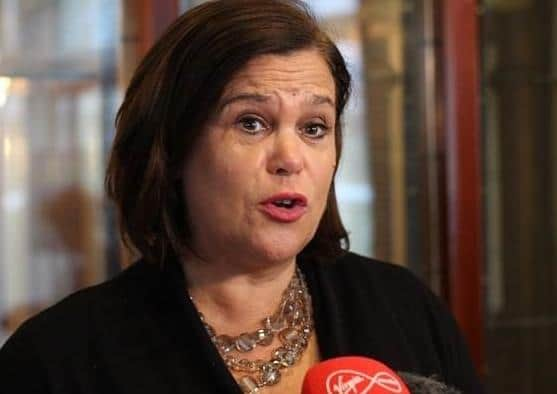Alex Kane: So tell us Mary Lou, what is the Assembly really for?


She seems very keen on a border poll by 2025 and, if it fails to deliver for Sinn Fein (which I think it won’t at this point), to have one every seven years thereafter until she gets the result she wants.
I’m pretty sure she’d acknowledge that it’s impossible to create political stability in Northern Ireland on the back of a border poll, or series of them every few years, so she and Sinn Fein would also have to acknowledge that their approach has nothing to do with creating political stability in Northern Ireland. Hardly a surprise, of course, for a party that prioritises ‘A Nation Once Again’ above and beyond all else.
Advertisement
Hide AdAdvertisement
Hide AdHence my question, what purpose does she think is served by the Assembly? In the event that a border poll delivered the result she wanted then both Northern Ireland and the Northern Ireland Assembly would cease to exist. She hopes that will happen as soon as 2025. That being the case what incentive is there for her to lay down a framework for genuine cooperation between unionism and republicanism here.


Indeed, what incentive is there for unionism – even the ‘moderate’ elements – to lay down a framework for genuine cooperation when it, too, knows that Sinn Fein has no long-term (or even short-term interest) in the existence of either the Assembly or Northern Ireland? And even if a border poll in the next few years failed to deliver for her, I can’t imagine Sinn Fein would interpret the result as a mandate to start prioritising a successful, functioning, genuinely power-sharing Assembly.
McDonald would, obviously, point the finger of blame at the DUP, citing the contents of Martin McGuinness’s resignation letter in January 2017: ‘The equality, mutual respect and all-Ireland approaches enshrined in the Good Friday Agreement have never been fully embraced by the DUP. Apart from the negative attitude to nationalism and to the Irish identity and culture, there has been a shameful disrespect towards many other sections of our community. Women, the LGBT community and ethnic minorities have all felt this prejudice. And for those who wish to love their lives through the medium of Irish, elements of the DUP have exhibited the most crude and crass bigotry.’
Yet the DUP (and UUP) could just as easily point the finger at Sinn Fein, citing the tendency of McDonald and other senior figures to commemorate and celebrate the lives of IRA members; the tendency of some Sinn Fein to shout ‘Up the Ra’ or ‘Tiocfaidh ár lá’ on any and every occasion; and, as stated in a paramilitary assessment report in 2015 and referenced again in the last couple of weeks, the IRA Army Council still exists and ‘oversees both PIRA and Sinn Fein with an overarching strategy’.
Advertisement
Hide AdAdvertisement
Hide AdIndeed, at the end of January Conor Murphy did nothing to deny the conclusions of the report, merely saying: “If there was a crisis tomorrow morning, I don’t doubt we would draft in a team to try to manage our response to it. The team would involve a range of people including elected and non-elected representatives.”
Shortly before that report was published the UUP had already withdrawn from the Executive (August 2015), with then UUP leader Mike Nesbitt confirming: “We are walking out of the Executive because we cannot sit with Sinn Fein because we do not trust them.”
Responding to the Army Council’s ongoing influence when the report was published (October 2015) he noted: ‘This blows a hole in SF’s argument. They demand we respect their political mandate, but they now need to make clear the extent to which that mandate is shaped by a group of unnamed shadowy figures who in the past have overseen the most lethal terrorist force on the planet.” I’m not entirely sure what has happened in the meantime to convince the UUP that a return to the Executive was justified.
Anyway, at the heart of the present relationship between unionism and republicanism (particularly between the DUP and Sinn Fein) is a deep, ever-widening lake of toxicity. Whatever Arlene Foster and Michelle O’Neill may say in public about the willingness to work together and to cooperate for the good of Northern Ireland, the inescapable, unavoidable fact remains that genuine cooperation is not possible between them. They rejoined the Executive for mutually contradictory reasons a month ago and they remain in it for mutually contradictory reasons.
Advertisement
Hide AdAdvertisement
Hide AdIn the run-up to Northern Ireland’s centenary in 2021, Foster will push something which she describes as a ‘New Generation Unionism’ project, while Sinn Fein (hoping for even better results if a second election is called in the Republic) will turbo-charge its longstanding ‘unity project’.
As I say, those projects are mutually contradictory; and being mutually contradictory makes it impossible for both parties to meet in the middle. Which is why they aren’t even trying.
So – and the question now applies to both Sinn Fein and the DUP – what purpose is served by a rebooted Assembly? It gave the DUP a ‘position of influence’ to replace the one it lost in Westminster in December. Sinn Fein wanted to be able to signal to a broader electorate in the Republic that it is capable of a coalition with the most unlikely partners. That’s why both rushed back when Julian Smith (who, despite the views of some unionists, didn’t force either of them to do so) offered them a route back to the Executive.
But again, when you’re not actually in the same place for the same reason, let alone the same political purpose, I’ve no idea how anything resembling progress and mutually beneficial cooperation can emerge. Worryingly, that ‘deep, dark and unpleasant place’ I wrote about two weeks ago seems uncomfortably close.